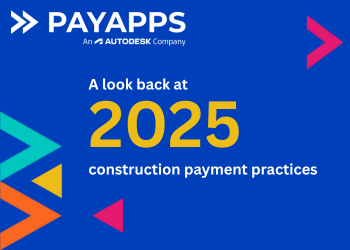With the construction industry under increasing pressure to make tight deadlines and remain financially secure during the ongoing cost-of-living crisis, late payments can cause significant financial challenges. However, the effects of delayed or missed payments aren’t just financial – they can often impact wellbeing too. In fact, a survey carried out in December 2023 by Construction News revealed late payments from main contractors impacted the mental health of more than four in five specialists.
Lyn Crozier, Product Specialist at Payapps, looks at the human impacts of late payments in the construction industry and underlines the importance of utilising technology to streamline the application for payment process to save time and money, and reduce mental strain.
Predictions suggest the construction industry is set to see increased demand in the coming months and years. While this is encouraging news for those in the built environment, it also brings with it additional pressures around the meeting of tight deadlines – especially with the industry currently facing a skills shortage.
This is unfortunately compounded by data suggesting inadequate contract administration is causing an increase in the number of adjudication referrals across the UK construction industry. In fact, a report by King’s College London revealed there had been 2,264 adjudication referrals between May 2023 and April 2024 – a 9% increase on the previous year.
When you consider that 4,032 construction companies became insolvent in 2024, it becomes increasingly apparent that the effects of delayed or missed payments – along with payment disputes – aren’t just financial, they’re emotional too.
With Mental Health Awareness Week taking place later this month, between Monday 12th May and Sunday 18th May, the time to acknowledge the impact late payments can have on those in the construction industry, and illustrate the importance of utilising technology to save time, money, and hassle, is now.
Stress and anxiety caused by late payments
Subcontractors and sole traders working in the construction industry rely on timely and accurate payments to cover their critical expenditure, such as materials, wages, utilities, mortgage or rent.
Indeed, forecasting and managing cashflow can be a real challenge for subcontractors uncertain as to whether they are going to be paid on time or if they are to receive the value applied for.
So, when payments are delayed or incorrect, or there are disputes, the uncertainty of income can create constant mental pressure and stress. This is highlighted by a survey carried out by IronmongeryDirect in 2022 that revealed finances were the principal cause of stress for 34% of those working in construction.
Especially for those operating on thin margins, the ability to pay bills on time as a result of timely payments from contractors or large organisations is therefore absolutely crucial for their financial, and mental, health.
Finding a balance between chasing payments and maintaining business relationships
While ensuring they are paid on time is crucial for subcontractors and others in the industry, many often feel trapped between chasing payments and maintaining business relationships. Put simply, if they are too assertive, it can risk the attainment of future work. Conversely, if they remain silent, they could be continually exploited.
Additionally, disputes, adjudications, and legal action over payment terms can not only be expensive; they can be emotionally draining, too. It’s therefore essential that anyone in the construction industry successfully treads the line between being too forceful when claiming payments, and not bold enough.
Reduced confidence of small businesses
It’s also worth considering the impact late payments can have on the confidence of smaller businesses and contractors. Uncertain payment terms or disputes will often make them less likely to take on new projects or work with new contractors. Likewise, they could often forgo attempts to grow their business because of hesitation over the viability of a project or whether they feel they can risk their resources.
Of course, while subcontractors are likely to be most impacted by disputes and payment delays, the application for payment process can also significantly affect the mental health of contractors and others managing project finances.
Time taken can often be considerable
Managing applications for payment can often be time consuming – highlighted by a statistic from Payapps’ 2024 survey of quantity surveying professionals that revealed 43% of respondents spend 10+ hours per week on manual administration or working within spreadsheets.
Furthermore, there can also be a lack of cashflow predictability due to not having full visibility of what is still to be certified or what is to be paid.
Not only does this highlight an issue for the industry when it comes to the frequency and real-time visibility of on-time payments, it also suggests people are taking many hours out of their busy days to chase others or undertake administrative tasks.
With this time better spent doing other important tasks, it’s no surprise to suggest wasted time spent managing applications for payments causes undue stress and mental strain on contractors and any finance professionals in the construction industry.
Ensuring compliance with regulations can cause sleepless nights
With the Fair Payment Code and the UK Construction Act mandating that subcontractors and anyone else involved in a project are paid fairly and on time, contractors can often face tight payment deadlines – further increasing stress and pressure.
In fact, the regulations dictate that they must provide a full audit trail of actions taken, including any work carried out, when it took place, and who undertook it. While this increased transparency and accountability is a positive for the industry and reduces the chances of missed deadlines and smash and grab adjudications, this can heighten the challenges and demands on contractors. Which brings us to…
The importance of utilising technology to relieve stress and provide peace of mind
For many years, the construction industry has used spreadsheets and emails to submit and record application for payment data. However, this manual process can often lead to errors or inaccurate calculations – resulting in project and payment delays.
Additionally, with spreadsheets rarely subject to meticulous checks and errors of over or under value not particularly obvious, it can be very easy to get payments and valuations wrong – leading to fractious relationships, over- or under-spend, or project delays.
This is why many subcontractors, contractors, and finance professionals are turning to technology to help. Fully automated software for preparing, submitting, and managing applications for payment, such as Payapps, offers significant cost and admin time savings while increasing accuracy and reducing risk.
By simplifying application submission and making the tracking of application status more transparent, innovative payment software makes life simpler and much less stressful for subcontractors needing to accurately forecast and manage cashflow. Furthermore, having one set of numbers approved and time-stamped through a logical, automated workflow sequence makes approval and certification a more streamlined process.
Improving accuracy and reducing the potential number of disputes over payments and valuations means projects will more likely be completed on time and within budget. Consequently, pressures on both contractors and subcontractors will be reduced – crucial given the expected increased construction demand in the coming months.
Software such as Payapps can also enable a streamlined accounting process and much tighter control over variations, which applications are still to be certified, and which need to be paid. This helps those in charge of finances maintain reliable cashflow forecasting and provide peace of mind that everything is being regularly monitored – ensuring compliance with the relevant regulations.
With mental health a significant issue in the construction industry, and people often lacking the courage to openly discuss concerns or seek help, reducing stress by introducing technology that removes ambiguity and fast-tracks payments is a sensible option.
As a market-leading Cloud-based solution, Payapps makes submitting and approving payment applications easier, faster, and more accurate while improving cash flow predictability and collaboration between contractors and subcontractors. The result? Reduced stress and mental anguish for money and deadline-conscious construction professionals across the industry.




